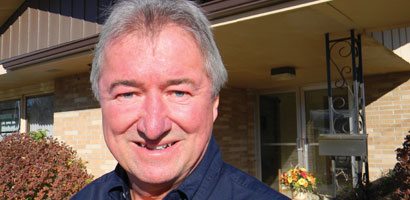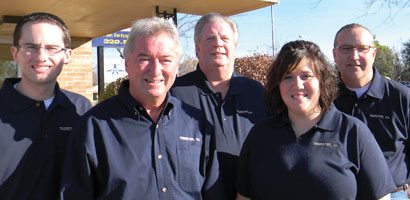Seed brokerage company Thurston Inc. celebrates 30 years in the business and its success stems from two simple things—great employees and great relationships with customers.
Reflecting on 30 years since the August 15, 1980 start of Thurston Inc., company president Robert Thurston modestly attributes his seed industry success to the encouragement, support and cooperation of many friends within the seed industry. “Plus the hard work and dedication of my own employees,” he adds. “That’s what really counts.”
At age 29, Thurston approached his Olivia, Minn. banker for a $60,000 loan so that he and Sue Wagemaker, his first employee, could set up shop and start a seed brokerage business. Six months later, Thurston Inc. repaid that $60,000 note and, as the saying goes, the company hasn’t looked back since. Today Thurston’s seed brokerage business provides information and seed services to nearly 200 seed companies. The company’s network of 40 professional seed growers covers Minnesota, Iowa, Illinois, Indiana and Nebraska.
However, Thurston, now 59, didn’t start out as a rookie. He already had 11 years of seed industry experience with the Trojan Seed Company and RBA Seeds. “Those years provided a great training ground for starting my own company because I already was working with other companies on seed procurement, quality control and seed production,” he says.
He sensed in his start up year that a lot of people in the seed industry wanted him to succeed and wonders if part of that was simply the “goodness of people wanting to help this young guy get going. You are forever indebted and don’t know exactly who to say ‘thank you’ too,” says an always humble Thurston.
His early experience suggested the need for a brokerage firm to provide additional services beyond the traditional brokering of seeds already produced. Thus his design was to focus on people who really understood seed production and seed processing plus the genetic and agronomic characteristics of inbreds and hybrids. In essence his firm became an agronomic business rather than just a marketing function.
“We wanted to get on the front end with a service of actually producing seed for various seed companies. In essence we would take their inbreds, their hybrids and find professional seed growers across the Corn Belt to grow their products,” explains Thurston.
Information Center
Today, Thurston describes his company as an “information center” for the seed industry. He and his staff provide advice on critical issues such as:
• Seed supply and demand
• Crop reports from across the Corn Belt
• Quality issues as a result of weather and environmental challenges
• Inbred and hybrid characteristics on a regional geographic basis and sometimes even reflecting differing soil types across the Corn Belt
• And perhaps most basic to any of his customers: helping them decide what’s working and what’s not working
Like all seed industry participants, Thurston stays posted on acquisitions by the major players of the seed industry including Monsanto, Syngenta, Bayer, DuPont, Dow AgroSciences and BASF. However, he notes there are still approximately 200 seed corn brands in the marketplace, which also includes about 150 independent seed companies for which Thurston Inc. provides ongoing inventory management assistance.
Recognizing the American farmer as being the “bread and butter” of the seed industry, Thurston senses today’s corn grower truly appreciates the tremendous strides that have been taken in recent years both in genetics and trait technologies. He admits that today’s business landscape is getting more challenging as genetic choices become more difficult and input costs keep escalating, both for farmers and seed growers. “Things were much simpler when I started; even 10 years ago genetic choices were easier. Today every seed company has good hybrids. You just don’t see much range from the best to the worst because so often weather-related events dominate all other inputs, including genetics,” he says.
Thoroughbreds are Hot
Because of the increasingly competitive nature of farming, Thurston notes corn growers today readily jump onto the new thoroughbreds. “The American farmer recognizes the value of top genetics; and the protective value of key traits. However his bottom line is still a single factor called yield,” he says.
However, genetics can still only get you so far. His read on the 2010 crop year? Good but not great. Because seed yields generally support grain yields, he says some Illinois/Indiana seed yields produced 20 percent lower than earlier predicted. As good as things looked early on this season, Mother Nature laid a fair amount of stress on cropland across America this year, especially with record mid-September rains.
300 Bushel Corn
Admitting that he may be looking through rose-colored glasses, Thurston readily projects that the American corn farmer will reach that 300-bushel plateau even before the 2030 prediction of many seed industry professionals. He also projects that Thurston Inc. will be a major contributor to that goal and to the ongoing growth of the American seed industry and the American corn farmer.
“My goal is that Thurston Inc. becomes the ‘superstore’ of the seed industry,” says Thurston, explaining that the company has enough shelf space to service anyone. “We are a service provider so anyone wanting to bring their genetics and traits into the marketplace should use us because we have the seed grower network, we have the customer base and we have good relationships with our customers.”
Seed industry trust is how Thurston summarizes the success of his 30-year-old company, and “that happens because of great employees and great relationships with our customers.” Dick Hagen














